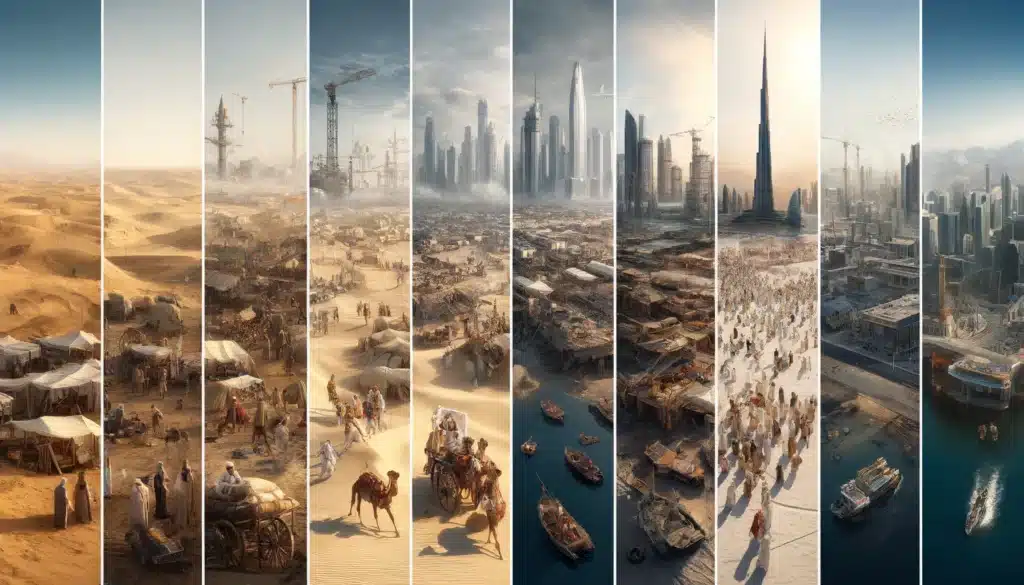The United Arab Emirates (UAE), a federation of seven emirates, has risen from humble coastal settlements to a leading global hub for trade, tourism, culture, and innovation. This transformation — achieved in just a few decades — stands as one of the most remarkable stories of modern nation-building. But to truly understand the UAE, one must explore not only its history, but also its traditions, etiquette, and the vibrant destinations that define it today.
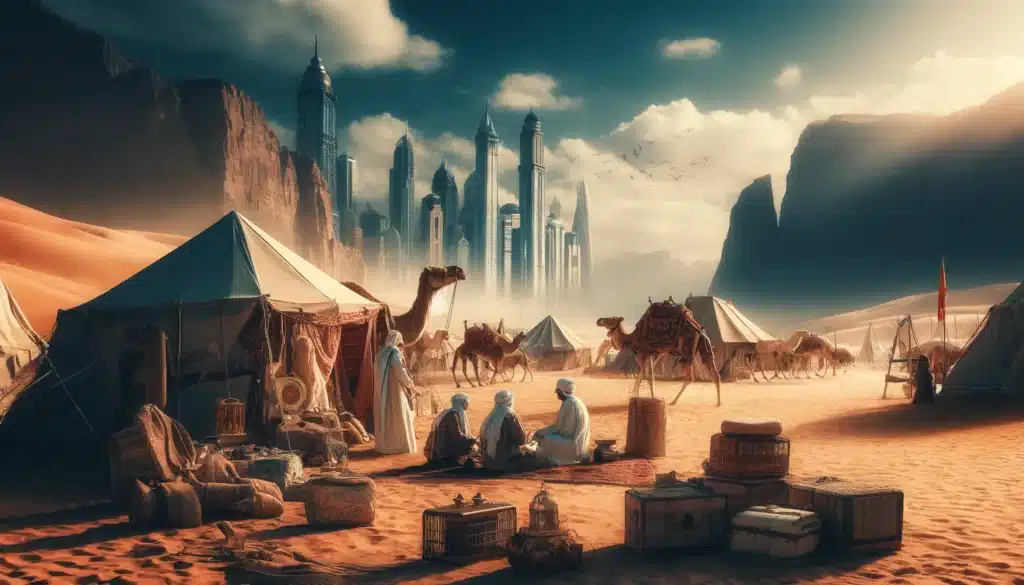
Ancient Roots and Pre-Federation Life
Historical Foundations
Archaeological finds trace human settlement here back to around 6,000 BCE. Early communities thrived along the coast, relying on fishing, trading, and date farming. Pearling became a mainstay from the late 19th to early 20th centuries, shaping the economy and social life.
The region’s strategic location along maritime routes between India, Persia, and East Africa made it an essential stop for traders. Dhows carried local goods outward and returned with spices, silk, and porcelain.
Cultural Etiquette Insight
Even today, the values from those times — hospitality, honour, and respect — remain central. Guests are welcomed with Arabic coffee (gahwa) and dates, a tradition worth remembering if visiting Emirati homes. Always accept refreshments with your right hand.
Must-Visit
- Al Fahidi Historical Neighbourhood (Dubai) – Wander its narrow lanes, wind towers, and museums for a sense of pre-oil Gulf life.
- Umm Al Quwain Dhow Yard – One of the few places where traditional dhow-building still happens.
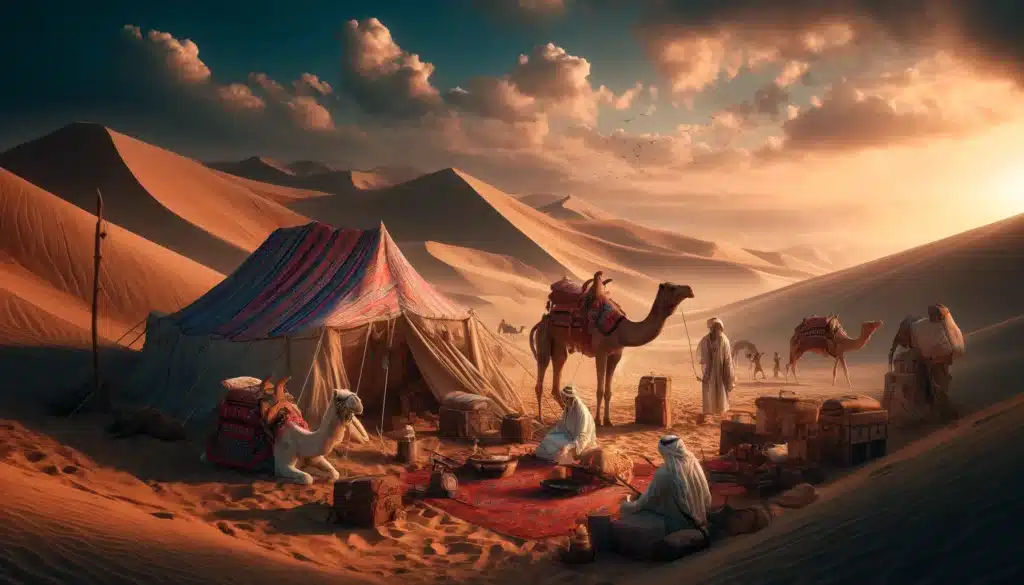
The Trucial States and British Protection
In the 19th century, piracy and tribal conflicts threatened regional stability. The rulers signed treaties with Britain — becoming the “Trucial States” — to protect maritime trade routes.
While the British oversaw defence and foreign policy, internal governance remained local. This era cemented the role of the majlis, a traditional council where citizens could meet rulers to discuss issues openly — a practice still honoured today.
Insider Neighbourhood Guide
Sharjah’s Heart of Sharjah – A living heritage district where restored souqs and houses preserve the emirate’s pre-federation charm. Best visited in the cooler months when open-air majlis events are held.
READ MORE: Visiting Dubai? You NEED One of These
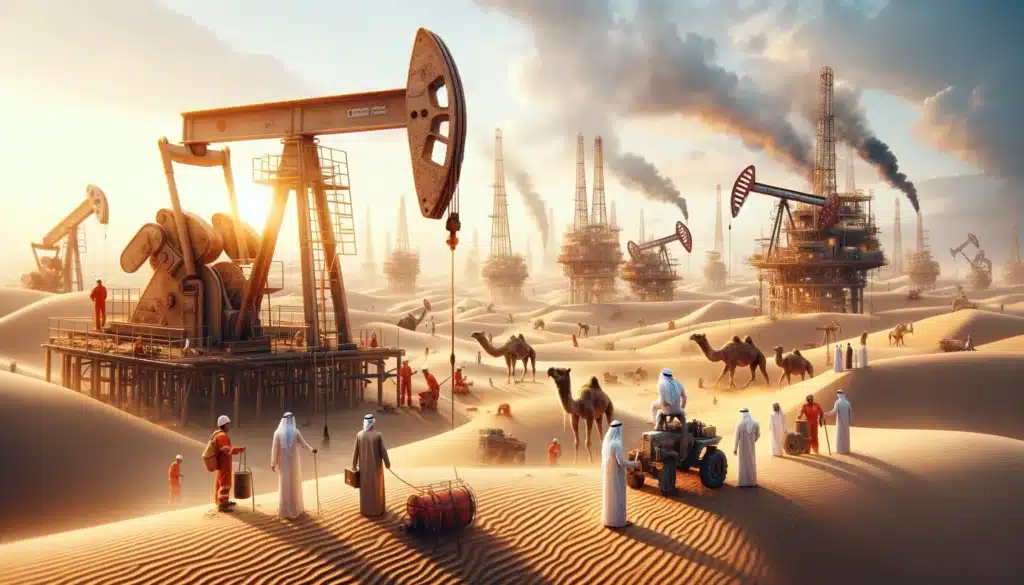
The Road to Federation
By the late 1960s, Britain announced its withdrawal from the Gulf. Sheikh Zayed bin Sultan Al Nahyan of Abu Dhabi spearheaded unity talks. On 2 December 1971, six emirates united to form the UAE; Ras Al Khaimah joined on 10 February 1972.
The first National Day celebrations were modest compared to the dazzling spectacles of today — yet the optimism and unity forged then continue to define the nation.
Cultural Etiquette Insight
National Day is a proud moment for Emiratis. As a visitor, wearing the UAE flag colours (respectfully) or joining public events is welcome. Avoid political commentary; focus on celebrating the unity and culture.
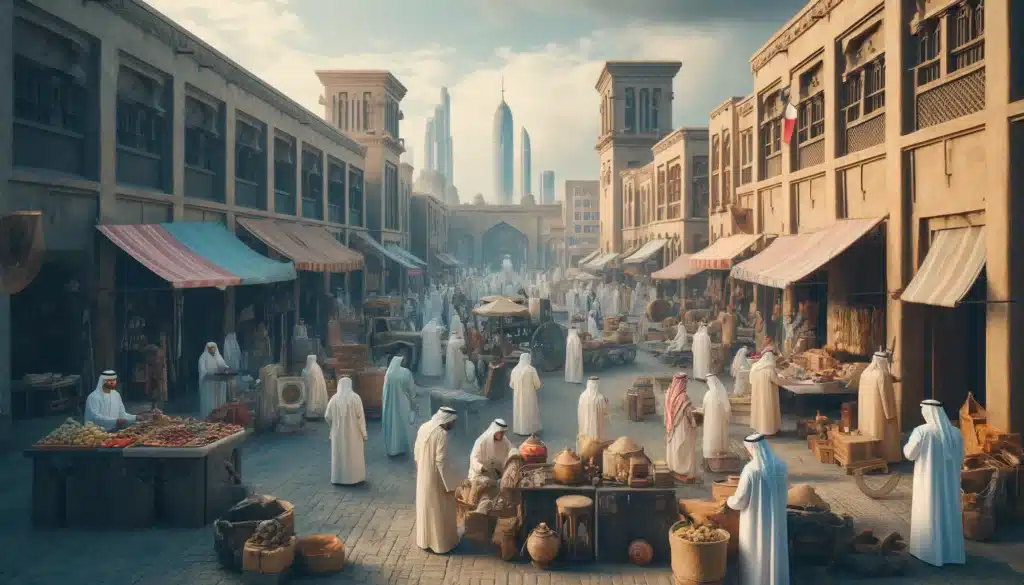
The Discovery of Oil and Rapid Development
Economic Turning Point
Oil discoveries in Abu Dhabi (1958) and Dubai (1966) transformed the economy almost overnight. Sheikh Zayed insisted oil wealth be reinvested in infrastructure, healthcare, housing, and education.
By the 1980s, paved roads connected towns, hospitals replaced rudimentary clinics, and schools were accessible to all.
Must-Visit
Dubai Creek – See the old port area where goods once arrived before the oil boom.
Abu Dhabi’s Sheikh Zayed Grand Mosque – A symbol of the wealth used for public good; open to non-Muslims, with free guided tours.
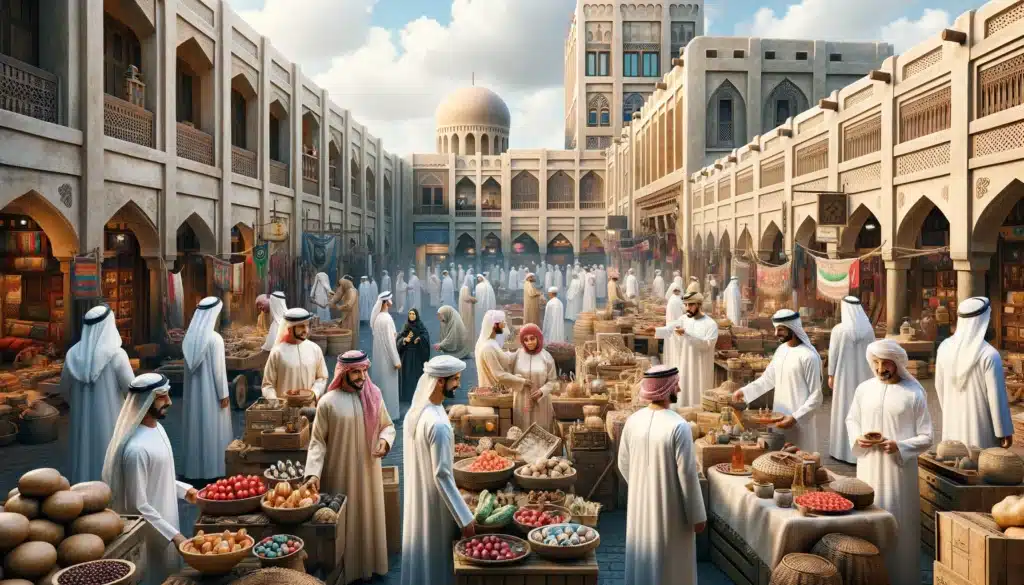
Dubai’s Diversification Vision
Recognising limited oil reserves, Dubai’s rulers pivoted towards trade, finance, tourism, and logistics. The construction of Jebel Ali Port, the launch of Emirates Airlines, and the development of free zones attracted foreign investors.
Today’s skyline — from the Burj Khalifa to Palm Jumeirah — reflects this diversification success.
Insider Neighbourhood Guide
Deira Gold Souk – A throwback to Dubai’s trading roots; arrive early to avoid the crowds.
Alserkal Avenue – Dubai’s contemporary arts hub, symbolising its cultural diversification.
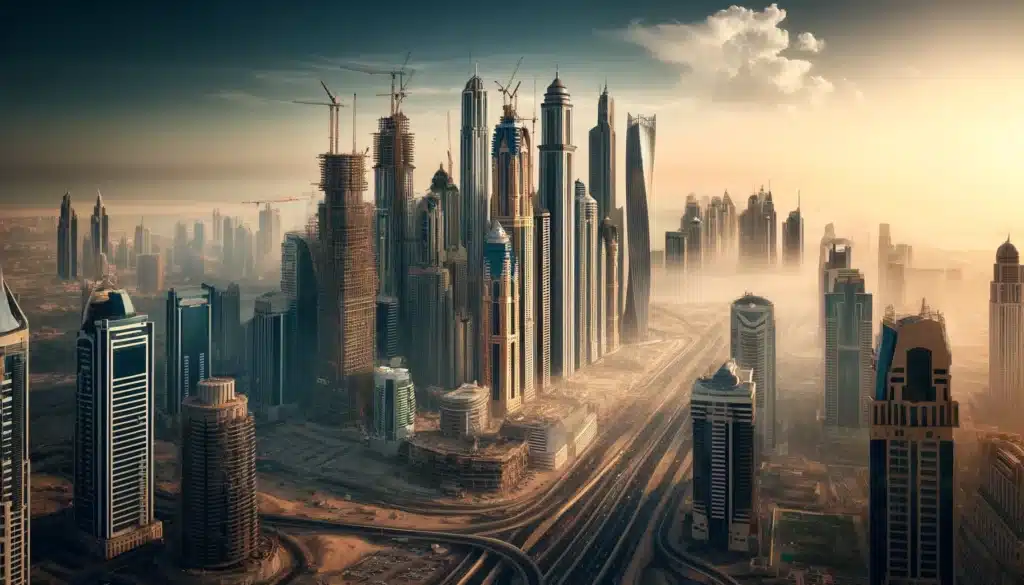
Preserving Culture Amidst Modernisation
The UAE balances ultra-modern infrastructure with cultural preservation. Falconry, camel racing, and pearl diving festivals keep traditions alive. UNESCO-listed sites like Al Ain Oasis show the ingenuity of early desert agriculture.
Cultural Etiquette Insight
At heritage sites, dress modestly — shoulders and knees covered — to show respect for tradition. Always ask before photographing locals, especially women.
Social Development and Education
From a largely illiterate population in 1971, the UAE now boasts a literacy rate above 95%. Global universities have campuses here, and public education is free for citizens.
Women’s empowerment is striking: they lead ministries, sit in the Federal National Council, and head businesses. The UAE Gender Balance Council ensures their continued advancement.
Innovation and Sustainability
The UAE Vision 2021 and Centennial 2071 aim for a diversified, sustainable economy. The Mars Hope Probe, AI investments, and Masdar City underline the nation’s ambition.
Must-Visit
- Dubai Expo City – Built from Expo 2020, it continues as a hub for innovation showcases.
- Masdar City – A living lab for renewable energy and sustainable urban design.
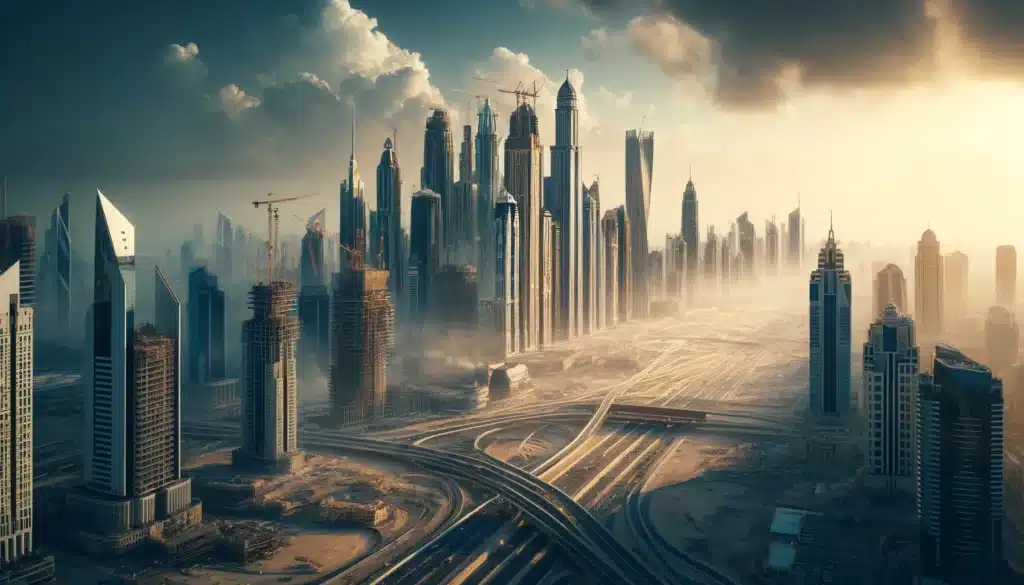
Global Diplomacy and Humanitarian Efforts
The UAE plays a stabilising role in the Gulf and has provided over $56 billion in foreign aid since 1971. The Abraham Accords in 2020 demonstrated its diplomatic boldness.
Distinct Personalities of the Seven Emirates
Each emirate retains its identity:
- Abu Dhabi – Cultural capital, home to the Louvre Abu Dhabi and mangrove kayaking.
- Dubai – Global tourism hub, home to Dubai Mall and Museum of the Future.
- Sharjah – UNESCO Cultural Capital, with 17 museums.
- Ajman – Laid-back beaches and dhow heritage.
- Umm Al Quwain – Mangroves, aquaparks, and birdwatching.
- Ras Al Khaimah – Jebel Jais zipline, historic forts.
- Fujairah – Mountains, diving spots, and centuries-old mosques.
Key Historical Milestones
- 6000 BCE – Early settlements.
- 1820 – First maritime truce with Britain.
- 1958-66 – Oil discoveries.
- 1971 – UAE formation.
- 1999 – Burj Al Arab opens.
- 2010 – Burj Khalifa opens.
- 2020 – Mars Hope Probe launch.
Final Reflections
The UAE’s history is more than dates and development projects; it’s a story of people — resourceful desert traders, visionary leaders, and a new generation shaping the future. Visitors who explore its history, respect its culture, and engage with its communities will discover a nation that blends tradition and modernity unlike anywhere else.



